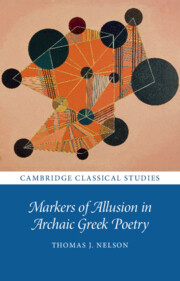Markers of Allusion in Archaic Greek Poetry
Challenging many established narratives of literary history, this book investigates how the earliest known Greek poets (seventh to fifth centuries bce) signposted their debts to their predecessors and prior traditions – placing markers in their works for audiences to recognise (much like the ‘Easter eggs’ of modern cinema). Within antiquity, such signposting has often been considered the preserve of later literary cultures, closely linked with the development of libraries, literacy and writing. In this wide-ranging new study, Thomas Nelson shows that these devices were already deeply ingrained in oral archaic Greek poetry, deconstructing the artificial boundary between a supposedly ‘primal’ archaic literature and a supposedly ‘sophisticated’ book culture of Hellenistic Alexandria and Rome. In three interlocking case studies, he highlights how poets from Homer to Pindar employed the language of hearsay, memory and time to index their allusive relationships, as they variously embraced, reworked and challenged their inherited tradition.
Thomas J. Nelson is a British Academy Postdoctoral Fellow in the Faculty of Classics, University of Oxford and Junior Research Fellow in Classics at Wolfson College, Oxford. He has published widely on archaic, classical and Hellenistic Greek literature.

